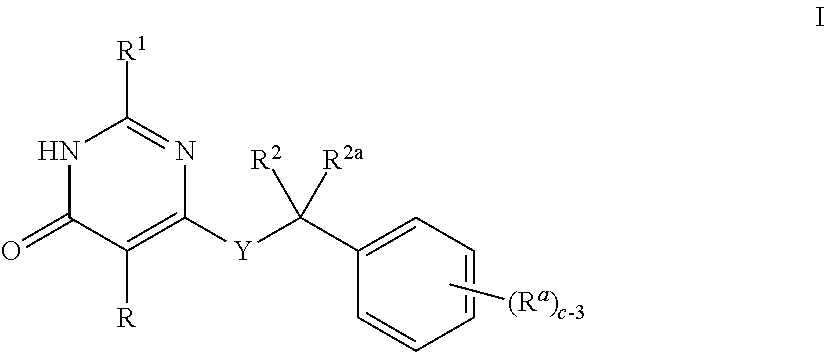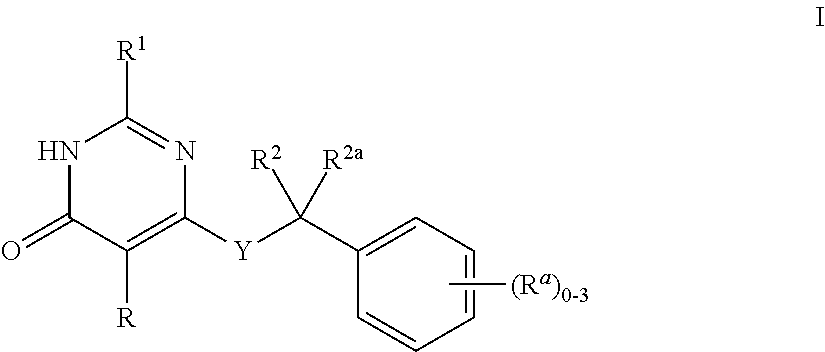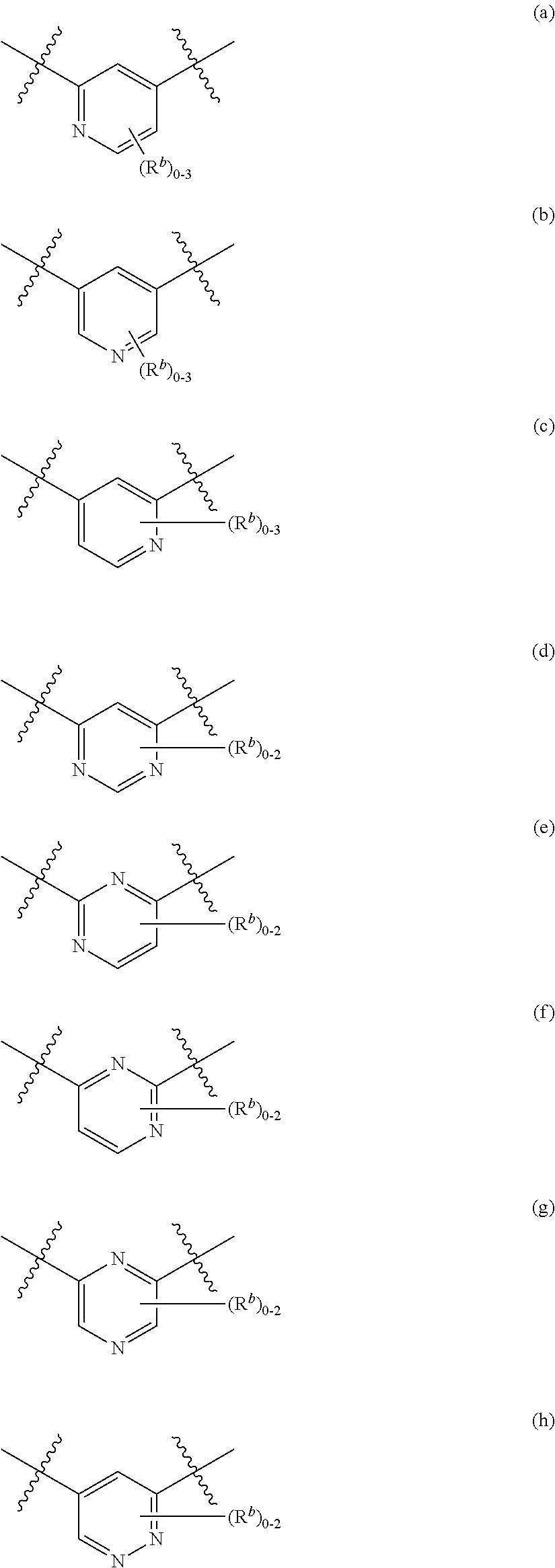Heteroaryl-Pyrimidinone Compounds as PDE2 Inhibitors
a technology of pyrimidinone and compounds, which is applied in the direction of drug compositions, organic chemistry, nervous disorders, etc., can solve the problems of high non-compliance or discontinuation rate of medication, lack of efficacy, and high rate of non-compliance or discontinuation of medication
- Summary
- Abstract
- Description
- Claims
- Application Information
AI Technical Summary
Benefits of technology
Problems solved by technology
Method used
Image
Examples
example 1
[0186]
2-Methyl-6-(5-(1-(4-(trifluoromethyl)phenyl)ethyl)thiazol-2-yl)pyrimidin-4(3H)-one, (Scheme 1)
Step 1. 4-Methoxy-2-methyl-6-(trimethylstannyl)pyrimidine
[0187]1,1,1,2,2,2-Hexamethyl-distannane (620 mg, 1.892 mmol) and tetrakis(triphenylphosphine)palladium (219 mg, 0.189 mmol) were added to a solution of 4-chloro-6-methoxy-2-methylpyrimidine (300 mg, 1.892 mmol) in 1,4-dioxane (3 mL). The reaction mixture was degassed with nitrogen 3 times and stirred for 1 h at 100° C. under and atmosphere of nitrogen. The reaction mixture was used in the next step directly without further purification. MS=285.0 / 287.0 / 289.0 (+ESI).
Step 2. 2-(6-Methoxy-2-methylpyrimidin-4-yl)thiazole
[0188]Cuprous iodide (108 mg, 0.567 mmol), lithium chloride (241 mg, 5.67 mmol), 2-bromothiazole (341 mg, 2.081 mmol) and 1, 4-dioxane (2 mL) were added into the mixture from step 1. Then the reaction mixture was degassed with nitrogen 3 times and stirred for 1 h in a sealed tube at 120° C. The mixture was cooled, fil...
example 2
[0193]
2-Methyl-6-(2-(1-(4-(trifluoromethyl)phenyl)ethyl)thiazol-4-yl)pyrimidin-4(3H)-one, (Scheme 2)
Step 1. 2-(4-(Trifluoromethyl)phenyl)propanamide
[0194]The title compound was prepared using procedures similar to those described in step 2 of Examples 4 and 5 using thionyl chloride, 2-(4-(trifluoromethyl)phenyl)propanoic acid and ammonium hydroxide to afford the title compound as a solid and was used in the next step directly without further purification. MS=217.7 (+ESI).
Step 2. 2-(4-(Trifluoromethyl)phenyl)propanethioamide
[0195]2,4-Bis(4-methoxyphenyl)-1,3,2,4-dithiadiphosphetane-2,4-disulfide (1.12 g, 2.76 mmol) was added to a mixture of 2-(4-(trifluoromethyl)phenyl)propanamide (0.300 g, 1.38 mmol) in 1,2-dichloroethane (5 mL). The resulting reaction mixture was stirred at 75° C. for 1.5 h. After cooling to RT, the resulting mixture was concentrated under vacuum. The residue was diluted with water (30 mL) and extracted with ethyl acetate (3×30 mL). The combined organic extracts we...
example 3
[0199]
2-Methyl-6-(4-(1-(4-(trifluoromethyl)phenyl)ethyl)thiazol-2-yl)pyrimidin-4(3H)-one, (Scheme 3)
Step 1. 6-Methoxy-2-methylpyrimidine-4-carboxamide
[0200]The title compound was prepared using procedures similar to those described in step 2 of Examples 4 and 5 using sodium 6-methoxy-2-methylpyrimidine-4-carboxylate and ammonium hydroxide to afford the title compound as a solid. MS=168.4 (+ESI).
Step 2. 6-Methoxy-2-methylpyrimidine-4-carbothioamide
[0201]The title compound was prepared using procedures similar to those described in step 2 of Example 2 using 6-methoxy-2-methylpyrimidine-4-carboxamide to afford the title compound as a solid. MS=184.4 (+ESI).
Step 3. 2-Methyl-6-(4-(1-(4-(trifluoromethyl)phenyl)ethyl)thiazol-2-yl)pyrimidin-4(3H)-one
[0202]1-Chloro-3-(4-(trifluoromethyl)phenyl)butan-2-one (from step 1 of Example 8) (0.109 g, 0.437 mmol) was added to a stirred mixture of 6-methoxy-2-methylpyrimidine-4-carbothioamide (80 mg, 0.437 mmol) in 1,4-dioxane (10 mL) and the mixture w...
PUM
| Property | Measurement | Unit |
|---|---|---|
| Volume | aaaaa | aaaaa |
Abstract
Description
Claims
Application Information
 Login to View More
Login to View More - R&D
- Intellectual Property
- Life Sciences
- Materials
- Tech Scout
- Unparalleled Data Quality
- Higher Quality Content
- 60% Fewer Hallucinations
Browse by: Latest US Patents, China's latest patents, Technical Efficacy Thesaurus, Application Domain, Technology Topic, Popular Technical Reports.
© 2025 PatSnap. All rights reserved.Legal|Privacy policy|Modern Slavery Act Transparency Statement|Sitemap|About US| Contact US: help@patsnap.com



